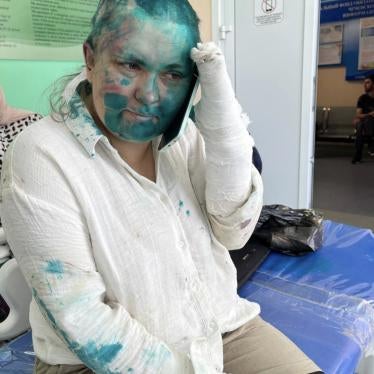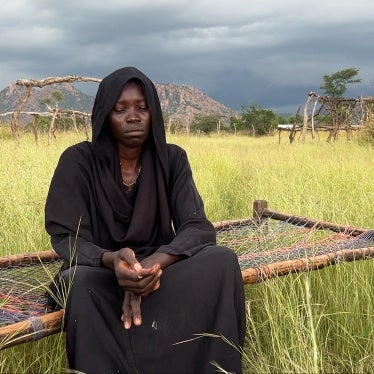Today for the first time the Russian Federation will assume the chair of the Committee of Ministers of the Council of Europe, shortly after the 10th anniversary of its joining the Council of Europe. We, Russian and international human rights organizations, strongly believe that this occasion carries special responsibilities and heralds opportunities.
Russia has made considerable progress in fulfilling a number of key promises and commitments it made when joining the Council of Europe. Among them it has signed and ratified the European Convention for the Protection of Human Rights and Fundamental Freedoms and several other Council of Europe conventions; transferred the supervision of the prison system to the Ministry of Justice; introduced new criminal, civil and procedure codes; and imposed a moratorium on the death penalty.
However, we are concerned that Russia has failed to follow up on a number of other commitments it made when becoming a member of the Council of Europe and to consistently cooperate with bodies of the Council of Europe. We are also concerned that the government’s adherence to respect for fundamental human rights and freedoms, particularly in the area of political freedoms has seriously declined in Russia in recent years.
We are hopeful that during its Chairmanship of the Council of Europe, Russia will take significant steps to enhance the respect and protection of human rights at home, and to encourage such enhancement across the Council of Europe region. We believe that by taking the measures as outlined below Russia will demonstrate its real commitment to the Council of Europe’s aims of promoting and respecting human rights, the rule of law and democracy.
- End Arbitrary Detentions, Torture, Ill-treatment, Enforced “Disappearances”, and Extra-judicial Executions in the North Caucasus.
The Russian army, federal security forces and officials as well as un-official units of the government of Chechnya have to strictly obey Russian law as well as international human rights and humanitarian law. All groups on the side of the Chechen armed opposition must refrain from all activities, which endanger the civilian population.
We urge the Russian authorities to put an end to torture and ill-treatment, arbitrary detentions, enforced “disappearances”, and extra-judicial executions. - Take Meaningful Steps to End Impunity in Chechnya
Upon becoming a member of the Council of Europe, Russia committed itself to ensuring that “those found responsible for human rights violations will be brought to justice - notably in relation to events in Chechnya” In cooperation with the Council of Europe the Russian authorities have taken some initial steps towards identifying exhumed bodies and investigation of human rights abuses. However, an overwhelming climate of impunity continues to reign in the region.
We urge the Russian authorities to make real measurable progress over the next six months in the investigation and prosecution of a number of key cases of human rights violation.1 - End Violent Abuses in the Russian Armed Forces
Upon accession to the Council of Europe, Russia also undertook “to reduce, if not eliminate, incidents of ill-treatment and deaths in the armed forces outside military conflicts”. Yet hazing and violent initiation practices in the armed forces still result in the deaths of dozens of young soldiers every year, and serious damage to the physical and mental health of thousands of others.
We call on the Russian government to present and implement a clear and comprehensive plan of action to end violent initiation practices in the armed forces. - Amendments to the Law on Non-governmental Organizations
In April 2006, a new law governing the work of non-governmental organizations (NGOs) came into force, which includes provisions that dramatically increase government control over the work of NGOs, and that may lead to even more sustained political interference in the activities of NGOs.
We call on the Russian government to amend the law and introduce safeguards to protect NGOs from arbitrary restrictions of their lawful activities. - Reform of the Procurator's Office
Russia has made a commitment when it joined to reform the Procurator's office in line with Council of Europe standards. However, this reform has yet to happen. A large body of research by the undersigned human rights groups illustrates that the procurator’s office routinely fails to promptly, thoroughly, impartially and effectively investigate allegations of human rights abuses.We believe that the Russian government should swiftly undertake a comprehensive process leading to a thorough overhaul of the office of the procuracy, in line with European standards and thereby allowing for access to effective redress and accountability for human rights violations.
- Cooperation with the Committee for the Prevention of Torture
In 1998, Russia ratified the European Convention for the Prevention of Torture and Inhuman or Degrading Treatment or Punishment. In doing so, it committed itself to cooperating with the European Committee for the Prevention of Torture (CPT). While Russia has generally permitted the CPT to visit places where people are deprived of their liberty, we are concerned that during its most recent visit in May this year the CPT was initially denied access to the village of Tsenteroi in the Chechen Republic.2
Russia is the only Council of Europe country not to authorize the publication of all reports of the CPT’s visits. To date 12 out of a total of 13 reports of the CPT’s visits remain confidential. While not required to do so, authorization of publication of the reports has become an established practice of all other parties of the Convention.
We believe that Russia should ensure full cooperation with the CPT by among other things, ensuring the Committee access to all places where people are deprived of their liberty; making public plans for real and transparent efforts to implement the CPTs recommendations, and authorising, without further delay, publication of all reports of CPT visits to Russia. - Ratification of Protocol 6 to the European Convention for the Protection of Human Rights and Fundamental Freedoms (ECHR)
In 1996, Russia undertook to “sign within one year and ratify within three years” Protocol No. 6 to the ECHR, which provides for the abolition of the death penalty in time of peace. Although no death sentences have been passed or executions carried out for years, Russia has yet to ratify the protocol.
We urge the Russian parliament to ratify Protocol 6 without further delay. - Ratification of the European Social Charter
On accession as a Member State of the Council of Europe, Russia undertook to “study, with a view to ratification, the European Social Charter”. Russia signed the charter on 14 September 2000.
We believe Russia should finalize the ratification process during its Chairmanship
[1]Such as the systematic ill-treatment and enforced “disappearance” at the Oktiabrskii District Temporary Police Precinct in Grozny in the spring of 2000 or the “disappearances” of Said-Khusein and Said-Magomed Imakaev . The later is an applicant to the European Court of Human Rights in relation to his son's “disappearance”;
[2]On 1 May 2006 the CPT interrupted its visit to the North Caucasus after it had been denied access to the village of Tsenteroi. However, the CPT resumed the visit after receiving assurances from the President of Chechnya that it would be able to work without further interference.







